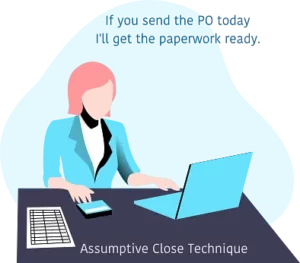This post will explain Sales closing best practices. If you asked many people what activity they associated most with sales, I ‘d think that numerous– if not almost all– of them would say, “Closing.” It’s the endgame for virtually every convenient sales procedure, however in spite of closing’s prominence, being an efficient sales closer isn’t especially user-friendly.
Best 13 Habits Every Effective Sales Person Needs to Adopt
In this article, you can know about Sales closing best practices here are the details below;
Closing requires a great deal of believing on your feet, perseverance, preparation, good sense, and experience– if you want to do it right. Here, we’ll take a look at some routines you can welcome, methods you can take advantage of, and state of minds you can adopt to consistently close and see the outcomes you’re after.
What is a sales closer?
They know the immediate begins right at the start of the sale. They understand that a close reaches both modes. They develop authentic urgency. They get buy-in on each action prior to transferring to the next one. They specify their prospects’ choice requirements early on They define their potential customers’ purchase procedure. They bring in all stakeholders prior to negotiation starts. They know how and when to remain client. They know when to request business. They know their bottom line. They close multiple times throughout the sales procedure. They interact plainly and concisely. They stay positive and expert. Also check Benefits of branding
1. They understand the close starts right at the commencement of the sale.
Good closers understand that the sales revolution doesn’t simply include one close. It’s a continuous process that underscores the sale as a whole– you’re closing a prospect from the first conversation you have with them.
Exceptional closers comprehend their purchasers’ goals, strategies, and difficulties– and they take advantage of that understanding to place their solutions as the most engaging choices their prospects have from the first day.
2. They understand that a close goes both ways.
The best closers don’t get lost tossing details, technical jargon, and figures at their prospects– hoping most of it sticks enough to land a deal. That technique is far too one-sided. Instead, terrific closers deal with potential customers to guarantee that a sale is equally useful.
For example, when the time concerns talk about pricing and execution, remarkable closers tend to currently have the context they need to make a compelling recommendation.
That originates from working carefully with their prospects and maintaining an active back-and-forth as an offer progresses– providing a leg up when it concerns understanding and communicating what will work best for their buyers.
3. They create authentic urgency.
Salespeople who reliably close never depend on the guarantee of a discount to get the offer over the finish line. Prices needs to never ever be the primary reason to purchase right now– as opposed to next week, month, or year. Terrific closers find a legitimate, pressing issue or chance related to their offerings.
They start by assisting a prospect understand that it’s in their benefit to purchase as soon as possible. They understand they can deal with that purchaser to find out the specific terms after– and if they do it right, those terms will not consist of a discount.
4. They get buy-in on each action before relocating to the next one.
Great closers never risk their time by completing deductions. They check to ensure they’re aligned with their possibility prior to moving on to another conversation at every step in their sales process. That way, their supreme close– asking for business– is a lot more likely to have a favorable result, as it becomes a natural next step in the process. Also check Dangers of using spreadsheets for sales
5. They specify their prospects’ choice requirements early on.
Surprises and sales tend not to mix well– because context, they’re typically a result of inadequate due diligence. The very best closers make it a priority to comprehend everything a possibility is evaluating as early on as possible, so they can offer worth in these areas throughout the sales procedure.
They never reach what they think to be completion of a sales procedure– just to unexpectedly discover that the buyer has three significant concerns they never thought about or addressed earlier on.
6. They define their prospects’ purchase process.
Is there a legal review procedure that will add one to 2 weeks to the sales procedure? Is your possibility required to examine a particular variety of vendors (as federal government companies frequently are)? Are there other procurement methodology requirements that will require input from you?
Fantastic closers plan around these steps as soon as that planning ends up being suitable. That lets them qualify for a seamless purchase process & keep a deal moving along effectively.
7. They generate all stakeholders before settlement starts.
There’s nothing worse than assuming you have the handle the bag and sitting down to work out– only to fulfill a previously-unknown stakeholder who has significant objections you need to attend to. To prevent this from occurring, ask, “Who else is involved in this choice that should be on our next call?” at the end of every sales discussion.
While it doesn’t make good sense for your point of contact to bring in the whole executive team on a very first conference, they definitely need to be looped in as the offer progresses– so you aren’t unexpectedly handling five various perspectives you didn’t recognize needed to be accommodated at the eleventh hour.
8. They understand how and when to stay forbearing.
You’re not moving to close a deal on your sooner call with a possibility– and you’ll likely strike more than a couple of tough “no’s” before you land one “yes.” You require to understand how to remain made up and in high spirits through that procedure if you’re going to be a terrific sales better.
You need to be tactically patient– on both an individual level and when connecting with potential customers. Hang in there through rejection, and attempt to prevent pressure selling when engaging with purchasers. That being conveyed, you can’t be too hands off when you try to close either.
9. They understand when to request for business.
Closing is not a siloed part of the sales process, but you still need to be proactive about it. When all your prospects’ requests have been fulfilled, it’s time to lay it all out on the table and ask your prospect if they’re prepared to purchase.
The secret here is identifying exactly when those requirements have actually been fulfilled. It’s simpler stated than done, but if you can determine and act on that bottom line in your engagements with potential customers, you’ll set yourself as much as close consistently and effectively.
10. They understand their bottom line.
Every prospect wishes to get an item for as little cash as possible, and every sales associate wants to offer a product with as little a discount applied as possible– however both parties more than happy with a figure someplace in the middle.
At the rear of the month & quarter, nevertheless, representatives under tension to fulfill or surpass quota can fall under the trap of believing they require to generate as numerous deals as possible. Also check Communication mistakes in the workplace
It’s important to remember that, at a particular point, the discomfort of accommodating the offer will go beyond the advantage of bringing it in. You require to know when to leave– whether that be when a prospect is requesting for an unreasonably deep discount rate, impractical application terms, or something else that would be a net negative for your business.
11. They close several times throughout the sales procedure.
Closers understand you don’t simply close once. Every discussion you have with a prospect should include you requesting some little close. Whether it’s requesting for a second phone call, a conference, or a pitch– you must have a close in mind at every touchpoint throughout your sales procedure.
12. They interact plainly and concisely.
Exceptional closers understand that puzzling or boring a possibility can make an otherwise appealing engagement dead on arrival. You require to keep buyers informed and interested– that starts with clear, concise interaction.
Do not toss excessive technical lingo around. Pare down what you wish to state to the absolute fundamentals, and relay that insight in a calm, authoritative tone. Keep a pulse on the conversations you’ve currently had to understand what the possibility already understands– and structure future conversations around that.
Practice by pretending you’re describing the value and energy of your offering to somebody without a comprehensive background on it. That ability– paired with substantial item knowledge– will translate well when you talk with potential customers who have some degree of familiarity with your product and services.
13. They stay favorable and expert.
As I discussed in the 8th point on this list, the very best closers know how to take rejection in stride– they comprehend it’s built into the task. You’re going to strike your share of “no’s” before you land a single “yes.” One key factor that separates excellent closers from their peers is positivity– they remain concentrated and in high spirits through hardship.
They also know not to get emotional and overzealous with tough potential customers. A sales process is a experienced engagement, & you need to treat it as such throughout its course. No matter what a potential does to irritate you, do not lose control of yourself.
Worst concerns worst you take out from the offer without burning a bridge. It’s not completion of the world, and if you can do it with grace and composure, you’ll avoid some prospective negative word of mouth.
How to Be a Closer in Sales
Closing shouldn’t be considered a one-off, dramatic affair. It’s a set of repeatable processes and methods that permeate every sales conversation you have with a possibility. By spreading these methods to your own selling, you’ll discover that closing comes more smoothly and naturally than ever before.








